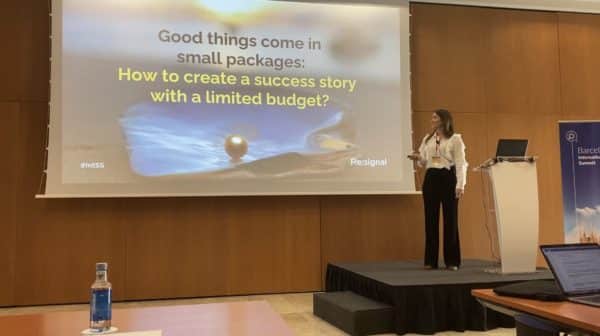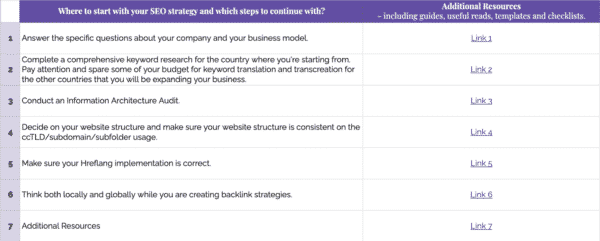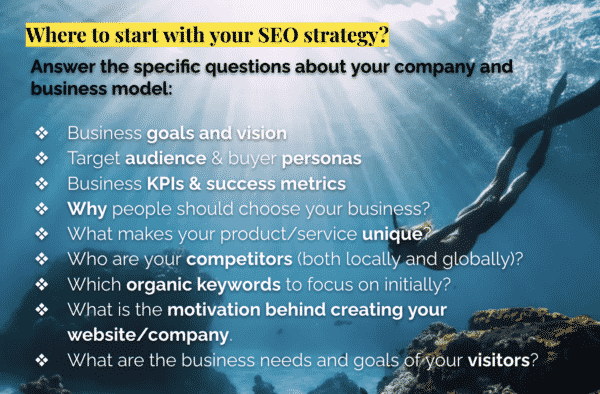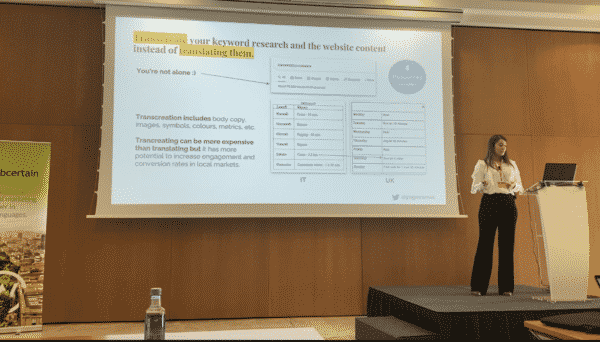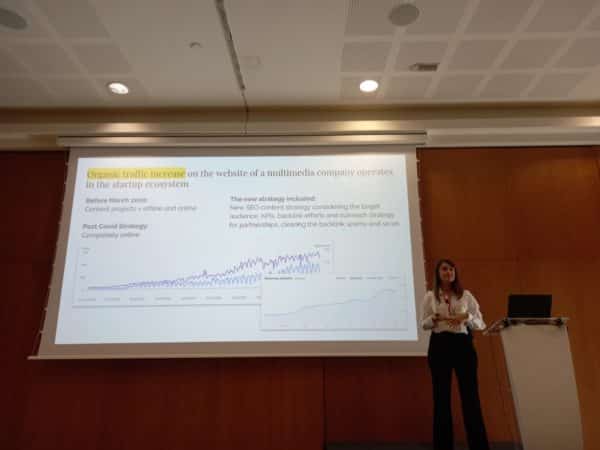This year, I decided to go outside of my comfort zone and carry out one of my 2021 goals, as I had a chance to speak at the International Search Summit Barcelona on 18th November. I was feeling so nervous and my hands were literally shaking when I entered the room. However, thanks to all the attendees who motivated me when I mentioned that it was my first public speaking experience, I had an unforgettable experience… (There is much more to share about my first conference speaking experience but that can be another topic to discuss later :))
First of all, I think a“thank you section” deserves the highestpriority for this post;
Thank you all #IntSS attendees for showing up, listening to my talk and also supporting me. I’ve received amazing mentions on my Twitter so far; which actually made me cry…
Special thanks to the Webcertain team for giving me this opportunity. It really means a lot as they showed faith in providing new speakers within our industry an opportunity.
Another thank you goes to some amazing people including my gorgeous mum, who came all the way from Turkey to Barcelona, to see me speak for the first time at a conference; and to my whole family, inspiring colleagues and fantastic friends who made this experience unforgettable with their support and motivation.
Quick Summary of my International Search Summit Talk:
My conference presentation covered international SEO guidance and recommendations for startups, small businesses and other companies. I wanted to provide a resource for international SEO strategy purposes, or for companies reconsidering their organic growth strategy using budget-friendly tools and resources.
Startup companies can face common challenges due to constant competition and trying to gain their presence in their chosen business niche. Business owners often spend time wondering how they can receive strong investment returns and how to manage these costs over the first few years. Most importantly, they spend time strategizing on how to create awareness on what they do and how they can assist people and achieve their goals.
Over the years, I had a chance to work at startups, small businesses as well as agencies, so I have become aware of the needs and challenges they commonly and frequently face. In fact, having also searched on Reddit, Quora, and Slack channels and online networking communities, I have come across questions and problems around “challenges businesses face” raised by business owners themselves. They were commonly having too many ideas, and not knowing how to develop these ideas, which steps to follow next, no clarity on their vision, short and long term goals, no clarity on their target audience, and thus buyer personas as well.
One of the ways to stay visible is to prioritize site visibility on search engines. To stay relevant and visible in search engines, startups have to optimize the use of SEO (Search Engine Optimization). This is a process of improving the visibility of a site online when people search for products and services related to the business. A business with higher visibility has higher chances of attracting potential customers or creating new areas to collaborate or partner with third parties.
Since we didn’t have enough time to go through all the steps in detail at the conference session, I have decided to create a comprehensive roadmap to support startups and small businesses through this exciting journey.
I have created a free Google Sheet resource which I’ve named “Good Vibes SEO Roadmap” which includes useful tips, roadmaps, guides, checklists, budget-friendly tools and further resources shared by industry experts in specific topics, to give you an overall perspective of the organic galaxy. The document was created considering the experts’ recommendations and suggestions as well as my own experiences, but is not limited to this information. In fact, I aim to update it regularly as I come across new cases and discover new budget friendly resources.
Here I have shared a few insights along with relevant links to the resources I shared within the presentation:
1. Things you should consider before creating an SEO strategy for your startup
- “64% of marketers actively invest time in search engine optimization (SEO) in 2020. This number increased to 69% in 2021.” Hubspot’s State of Marketing Report
- “Google doesn’t share its search volume data. However, it’s estimated Google processes approximately 63,000 search queries every second, translating to 5.6 billion searches per day and approximately 2 trillion global searches per year. The average person conducts between three and four searches each day.” Hubspot Blog
This emphasises the need to explore the power of SEO in connecting with your target audience. To achieve this, you have to create an SEO strategy that works for your business. It is important that you note that no single SEO strategy works for all.
Things to consider before creating a strategy:
- Consider your goals to find out what you intend to achieve: What aspect of it do you want to improve, do you want to grow your traffic or the number of clicks? This makes the process faster and easier. I have prepared some questions to answer to help you out during this phase of your strategy: Questions to Answer
- Evaluate your website, is it user-friendly and easy to navigate? You can get people to test this for you.
- Keywords are very important therefore you should leverage them to get niche traffic.
- Create good quality and relevant content that can engage the audience.
2. The importance of transcreation when it comes to keyword research for other countries
Transcreation is critical for companies that want to expand into international markets. To get consumers in countries where English is not the dominant or native language, it is important that websites get translated into native languages through transcreation and website localization. Transcreation is important in keyword research for the following reasons:
- Ensures the creation of unique content since it is done with the target audience in mind
- Increases the number of clicks through the creation of meta descriptions and page titles that appeal to users thereby sending signals to search engines to rank the site
- Reduces the bounce rate (however, bounce rate is a discussion topic regarding your aim with the page etc.)
- Encourages repeated visits by users
- Encourages social sharing. This may also provide you the opportunity to get backlinks in the natural way.
Please find the relevant guides, tools and tips at the following tab of the free sheet:
Keyword Research & Transcreation
3. The importance of information architecture audit and menu navigation structure
Information Architecture refers to the information backbone of a site, while navigation is the element of the user interface that allows users access to specific information present on the site. An Information Architecture audit is important because it analyses that information present in a website, what extra information that needs to be added to the website, and how it should be structured to increase traffic and improve user experience.
Menu navigation structure is important as it affects the total performance of search engine appearance. Small businesses and startups should pay special attention to these features.
If you would like to learn more about what Information Architecture is, and why it is important for SEO, I have created a post about this topic here: The Importance of Information Architecture for SEO.
In addition, you can also find a useful checklist which will help you to consider important factors of yourIA: Information Architecture (IA) Checklist
4. Things to consider while choosing your website structure: ccTLD, sub domain or sub folder?
Your business is beginning to think of expanding overseas and you are worried about how to structure your website. An important thing to consider is the optimization of the international website for SEO. The three structures include ccTLD, sub domain and sub folder. ccTLD is best for companies that are internationally-known as they have a large audience, the resources to build and maintain multiple websites, and develop unique contents. They should also have different product catalogs with country-specific targets. In the free roadmap sheet,
Choosing a web structure for your website when expanding globally is one of the difficult parts of international expansion, especially for startups. Depending on the domain type, there are some pros and cons you should consider. Within my free resource, I have provided the pros and cons shared by experts and some additional resources to provide more understanding around this area. I also find it useful to search your top organic keywords on the specific countries you will be planning to expand your business and see what kind of domain levels are ranking and are used in those countries. You can use the SEO Minion extension which is free to have a look at that.
5. Mistakes to avoid while implementing Hreflang tags
Hreflang tags are one of the important tools that help businesses provide outstanding experience for their customers. Hreflang tags not only influence customer experiences, they also influence SEO too. They are, however, not easy to implement and there are important mistakes that should be avoided while implementing them. Some of them include the following:
- Remember that whenever you add hreflang tags to pages, all of them must contain return tags
- Avoid missing self-referencing hreflang tags as this may result in indexing and misinterpretation problems.
- Ensure you use globally recognized codes for hreflang like ISO languages and country codes.
- Avoid Hreflang tags punctuation mistakes and typographical errors for example, using dashes instead of underscore.
- Use x-default tag to specify the default or international page
- Update your hreflang tags regularly to ensure they remain valid.
You can find the full list and insightful tools and resources for this process here.
6. The importance of local and global link building
Well, backlinks! Think both locally and globally when it comes to this tricky topic. Start with some existing opportunities. Find unlinked brand mentions. Consider media sponsorships with local events. Create long-lasting relationships with charities, organisations, local businesses. Provide testimonials to any trusted resource or platforms you have been using for your company. For example, a CRM tool, or an email platform or your online HR platform, project management tools etc. Publish listing contents in your niche, be present in your industry. Attend specific events and talks, etc.
Links are crucial in the optimization of a website. Link building helps a site rank high on google by causing it to be reputable. It is important because it helps search engines to find new web pages, determine the ranking of pages in the SERPs, boosts website authority and truth worthiness, helps search engines to crawl between the pages in a site.
There are different ways to build links and for the sustainability of every small business and startup, and at least one of them should be mastered and implemented for the business to stay ahead of the competition.
Here I have provided some backlink ideas and tips as well as the free backlink email outreach templates which I have used in my previous experiences and had a chance to understand their success: Backlink Tips & Outreach Email Templates

